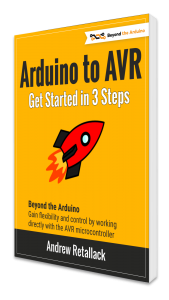It’s Tough being a Maker of Embedded Things
It’s Tough being a Maker of Embedded Things
As a fellow electronics enthusiast, I wonder if you ever feel the same way that I sometimes do?
- That there are so many more people working on so many more projects than you?
- That there are so many more people with deeper understanding of “all-things-electrical” than you?
- That there are so many more people who seem to be achieving great things with wonderfully complex projects?
- That it’s an uphill battle getting to grips with embedded systems
The truth is, it’s hard work being an electronics hobbyist / maker / enthusiast. I know this from speaking with my readers, from spending time on forums, from my twitter feed, from a host of interactions with hobbyists and enthusiasts and finally from my own experience. We have chosen to follow a hobby that doesn’t quite fit with the classic definition of “a pursuit … engaged in especially for relaxation”. It sometimes feels like we’ve chosen to climb Mount Kilimanjaro blindfolded and in sandals – ill-equipped and feeling our way along as best we can.
A Recurring Theme
Before you throw all your projects in a dumpster in despair (and boy have I sometimes felt just like doing that), let me tell you where I’m heading with this soliloquy. I spend much of my driving time listening to podcasts on a range of topics – electronics, writing, entrepreneurship, even marketing – and have picked up a recurring theme. A recurring theme across such unrelated topics? You bet! Distilled to its essence, the unsurprising theme is this: we can’t help comparing ourselves to others, and this comparison forms the lens through which we see ourselves. If others seem to be achieving more than us, it makes our journey (to learn, to create) seem more difficult than it really is.
A Consolation
I was speaking to someone the other week who was so exasperated with a specific problem he was facing, that he was about to throw the towel in not only on his project, but on his exploration of microcontrollers. Part of his frustration was linked to his perception that he was just not mastering things as easily as others. The challenge here was not so much the misbehaving microcontroller, but the perception he had of himself and his peers. I’ll reiterate my comment from earlier: the truth is we’ve all chosen a hobby that is extremely challenging – and we are all being challenged in similar ways.
Let’s pull this out of the hobbyist arena. I was listening to Elecia and Chris White of the Embedded.FM podcast the other week. They work full-time on embedded projects, and were talking about their knowledge, their memories, and their skills. Chris made a comment that I’ll paraphrase badly: a good engineer is not one who can remember everything, but one who knows where to find the information he needs to get the job done. Specifically they were talking about the SPI and I2C protocols. I had always assumed that good engineers knew these inside-out and could recite the timing diagrams in their sleep – but the reality is that many (most?) don’t. They know enough to be on the lookout for gotchas, and to be able to spend time digging through data sheets in order to get a project working.
A few months further back I was listening to Karl and Corey on The Spark Gap Podcast – both full-time engineers. They released an episode on some of the mistakes they’d made during their careers – really great listening if you want to see the mistakes that even the pros make.
Final Thoughts
In our media-rich world we are lucky enough to be exposed to experts in their fields: authoritative articles on Bluetooth or USB, in-depth podcasts on capacitors or inductors. The error that we can easily make is to assume that everyone is an expert in all fields – and to succeed we should be similarly expert on as wide a range of topics. This is an impossibility – we risk chasing knowledge breadth without time to gain the depth, spreading ourselves too thin, and coming out of it all frustrated with our lack of achievement.
I firmly believe we need to adjust the lens through which we regard our hobby and our participation in it: we need to accept it is tough but rewarding, and that almost everyone around us faces the same challenges and dead-ends that we do. With that context we can all hopefully derive a little more satisfaction, navigate a few more obstacles, learn by turning to others, and create, create, create!

I’ve just completed my brand new guide Arduino to AVR: Get Started in 3 Steps.
Get it now on Payhip for only $1.65.
Challenge yourself and learn how to gain the flexibility and additional control that the AVR microcontroller offers.
As a free bonus, get an ATmega328P pinout cheatsheet.



If this were easy it would all be over too soon. Then you gotta find a new hobby. I have been at this on and off for a year now and am still going back to find out how many ways to blink that LED.
Good point Leon – the challenge keeps us at it!
Hi Andrew,
Excellent blog.
It is consoling and encouraging, actually, to know that I am not so different from many others who are going through almost exactly the same tribulations trying to understand embedded electronics.
Also, good to know that I, being 66, am not exception here, on your site 🙂
Thank you very much.
Great Kris, thanks for taking the time to leave a comment. It’s rewarding to know that the time I put in resonates with others!